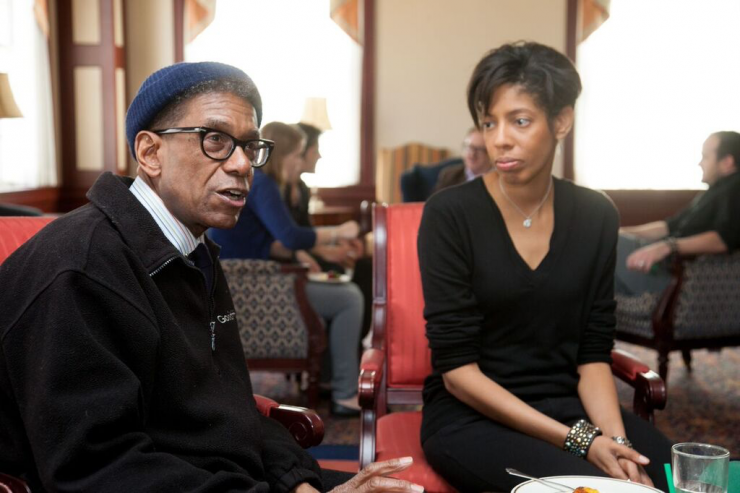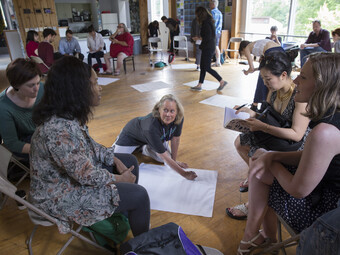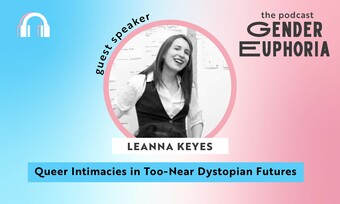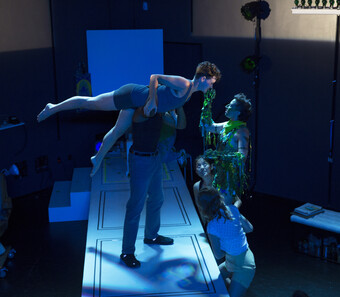Your Guide to Theatre Education
Professional Playwriting Program at Ohio University
In this series, David Dudley looks at the different models of theater education around the country through interviews, with the hopes that a new student will have an easier time finding the model that works for them.
Charles Smith is Head of the Professional Playwriting Program at Ohio University. His plays have been produced off-Broadway and from coast to coast by theaters such as Victory Gardens Theater, Goodman Theatre, People’s Lights & Theatre Company, St. Louis Black Rep, Berkeley Rep, and Ensemble Theatre in Cleveland.
David: When was the University of Ohio’s playwriting program started? When did you join?
Charles: I’m not sure when the MFA Playwriting Program at Ohio started. I interviewed for the job in 1995. Part of my interview included me staying an extra three days to be a guest mentor for the very first Playwrights Festival, so I don’t think it would be a stretch to say that it was a fledgling program before then. I know of only one writer who graduated from the program before I started and that was Dean Corrin, who became a founding member of the Victory Gardens Playwrights Ensemble and is now at DePaul University. Other playwrights who graduated from Ohio University include Scott McPherson (Marvin’s Room) and Eric Coble (The Given and The Velocity of Autumn), but they were not part of the playwriting program. They attended the university as actors.
We believe that the playwright is, or should be, the only creative artist in the room...This means that the vision of the play, and the responsibility for developing that vision, rests solely on the shoulders of the playwright.
David: What does Ohio's program offer potential students?
Charles: We offer a sheltered and supportive environment in which developing writers can identify and consequently cultivate their artistic voice and vision.
We offer our writers unfettered access to the stage by creating routine programmatic collaborations between our writers and actors, directors, and designers.
We demystify the writing process by offering specific and proven curriculum regarding the theories of narrative structure inherent in all narrative storytelling.
Finally, we offer our writers the opportunity to combine craft, voice and vision, and stage techniques learned through collaborations with actors, directors, and designers, so that they may graduate with a solid portfolio of produced work.
David: What makes Ohio's program different from others?
Charles: We believe that plays are written to be performed. Therefore, an important aspect of our program places our playwrights in the theatre, working with actors on new material that is performed before an audience every week during the three years they are here.
David: What are the guiding principles of the program?
Charles: We believe that the playwright is, or should be, the only creative artist in the room. That’s not to say that actors, directors, and designers cannot be creative because they most certainly can be and most are, but actors, directors, and designers are creative in their interpretation of the playwright’s vision. This means that the vision of the play, and the responsibility for developing that vision, rests solely on the shoulders of the playwright. This may seem unnecessarily proprietary to actors, directors, and designers, but it actually works in their favor because it frees them to the things they do best. For example, it frees a designer from having to design a realistic set establishing a time and/or place because the writer failed to infuse that information into the language of the play. If the writer has taken responsibility for the entire vision of the play, the designer is then free to be far more creative and abstract in their design. It allows an actor to be truly unique in her or his interpretation of a role rather than being forced to simply service the script. And it allows a director freedom for true interpretation rather than having to spend precious creative resources plugging holes and completing the vision.
David: Following that, what's working?
Charles: We have healthy, supportive, and dynamic relationship with the Professional Actor’s Training Program, the Professional Directing Program, and the Production Design and Technology Program. And we have seen many successful and dynamic writer/director and writer/actor collaborations that have extended deep into the professional arena.
David: What kinds of challenges have you faced? How do you intend to approach them in future?
Charles: The university is located in the foothills of Appalachian Mountains. It’s a gorgeously picturesque location with a lively arts scene and few distractions that we consider ideal for a writer. However, there is no major regional theatre here. To get to a major regional theatre, you have to travel to Pittsburgh, Cincinnati, Indianapolis, or Cleveland. Luckily, all of these cities are within a two and a half and three and a half hour drive.
To address this challenge, a few months ago the university entered into a partnership with the City of Dublin (outside of Columbus, Ohio) and the Dublin Arts Council to form a new resident professional theater company called Tantrum Theater to be located in Dublin, Ohio. This theatre will be Ohio University’s fully professional resident theatre company that will bridge the gap between our professional training programs and the professional theatre community.

David: What's missing, in your opinion, from the current education/ training programs available?
Charles: I see a lot of playwriting programs where there are few, or very limited, production opportunities. I don’t know how you can teach playwriting without giving students opportunities to work with actors and to see their work in front of audiences. It’s like trying to teach someone how to swim without ever actually allowing them to go into the water.
I also see some programs that propose to teach playwriting but they are ill-equipped to give developing writers the actual tools they might need organize ideas, to translate those ideas into story construction, plot, or character development. Some programs take a mystical approach to playwriting as if intuition alone can produce good plays. They operate on a “write it and I’ll tell you what you did wrong” basis.
David: Who do you feel is the ideal candidate? Who are you trying to bring into the Ohio family?
Charles: An ideal candidate for us is a writer with a distinctive voice, a writer who has something to say, and who says it from a unique point of view.
David: What do you hope your graduates/ trainees do, once they complete the program?
Charles: Many stay with their first love and continue working as playwrights or in new play development. Some branch out into television and film. Some work in print media. Some have a hand in podcasts. Some are writing story modes for video games. However, my goal, and the goal of the program, is to help our writers achieve their own individual objectives and become the artists they set out to be.
David: Any changes planned for the future?
Charles: We plan to continue to work with the university and the City of Dublin on the development of our professional resident theatre company. Our first season is close to being set, and while it has yet to be officially announced, the season will include a new play, Tammy Faye’s Final Audition by alumnus playwright Merri Biechler.
David: Success stories?
Charles: Too many to name here, and I ask that the writers who I did not mention because of space limitations to please forgive me, but a brief sampling include:
Laura Jaqmin, Plays: Look We Are Breathing (Sundance Theater Lab), Two Lakes, Two Rivers (O’Neill National Playwrights Conference, Royal Court Theatre’s International Residency). Television: Grace and Frankie (Netflix). Awards: Wasserstein Prize.
Qui Nguyen, Plays: The Vietgone Saga (South Coast Rep, Oregon Shakespeare Company, Manhattan Theatre Club). Qui is also co-Founder of the OBIE Award-winning Vampire Cowboys Theatre Company of NYC.
Jacquelyn Reingold, Plays: String Fever (Ensemble Studio Theatre, Playhouse West, Theatre J.). Television: Grace and Frankie (Netflix), Smash (NBC), In Treatment (HBO), Law & Order Criminal Intent (NBC).
Chantal Bilodeau, Plays: Sila (Underground Railway Theater) Pleasure & Pain (Magic Theatre, Foro La Gruta, Teatro La Capilla and Festival de Teatro Nuevo León in Mexico City). Chantal is founder of the international network Artists And Climate Change, and is a regular contributor to HowlRound.
Two up and coming writers to watch: David Mitchell Robinson, Carapace (Alliance Theatre) and The Imaginary Music Critic Who Doesn’t Exist (Steppenwolf First Look Series); and Bianca Sams, Just Porgy, (Nashville Rep/Ingram New Play Project). Bianca is also a contributor to HowlRound.








Comments
The article is just the start of the conversation—we want to know what you think about this subject, too! HowlRound is a space for knowledge-sharing, and we welcome spirited, thoughtful, and on-topic dialogue. Find our full comments policy here